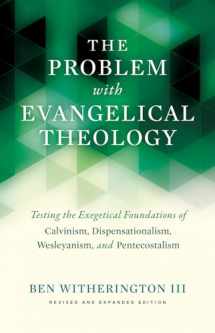
The Problem with Evangelical Theology: Testing the Exegetical Foundations of Calvinism, Dispensationalism, Wesleyanism, and Pentecostalism, Revised and Expanded Edition
Book details
Summary
Description
There is no doubting the legacy of the Protestant Reformers and their successors. Luther, Calvin, and Wesley not only spawned specific denominational traditions, but their writings have been instrumental in forging a broadly embraced evangelical theology as well. In this volume, Ben Witherington wrestles with some of the big ideas of these major traditional theological systems (sin, God's sovereignty, prophecy, grace, and the Holy Spirit), asking tough questions about their biblical foundations. Witherington argues that evangelicalism sometimes wrongly assumes a biblical warrant for some of its more popular beliefs, and, further, he pushes the reader to engage the larger story and plot of the Bible to understand these central elements of belief.


We would LOVE it if you could help us and other readers by reviewing the book
Book review



